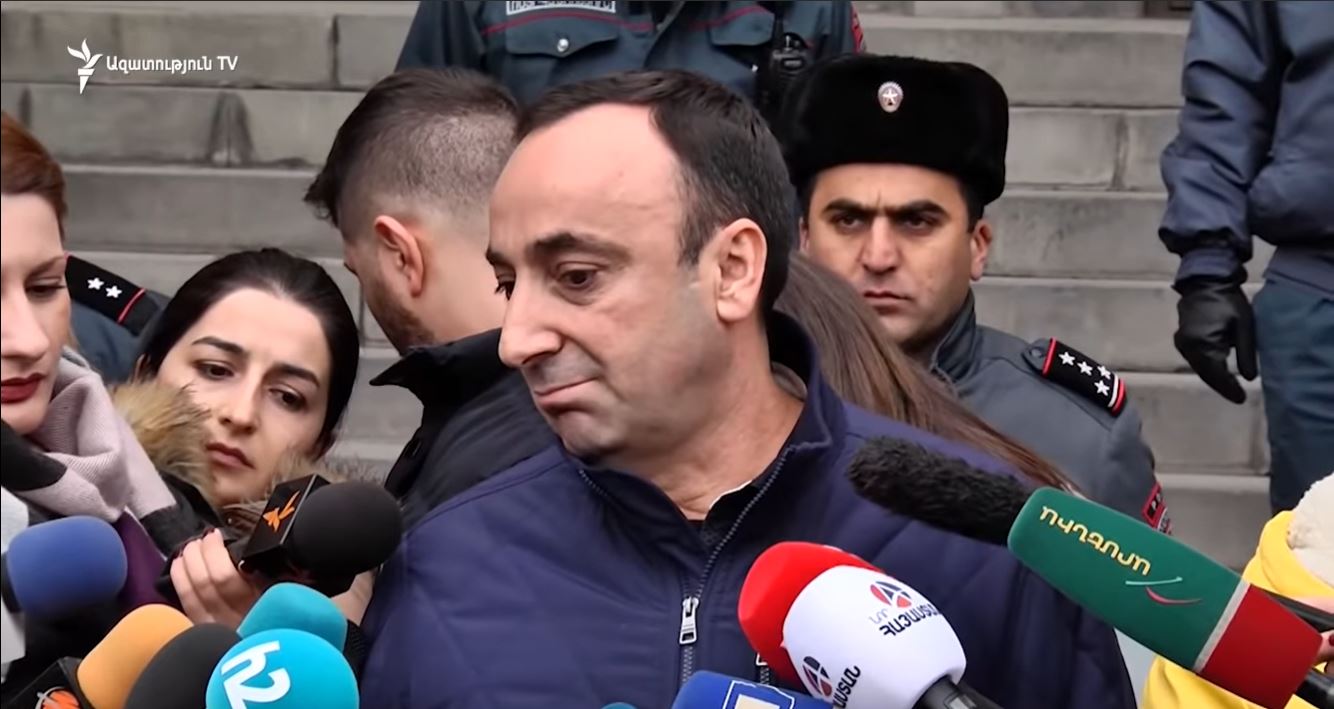

The chair of Armenia’s Constitutional Court, Hrayr Tovmasyan, has been officially charged with abuse of power. The General Prosecutor’s Office announced that Tovmasyan abused his power as Minister of Justice and obtained land from notary officials through pressure and intimidation.
Hrayr Tovmasyan was charged on Friday. The General Prosecutor’s Office (GPO) claims that his immunity as a Constitutional Court member does not apply as he allegedly committed the crime before his appointment to the Court.
Tovmasyan, who served as Minister of Justice from 2010-2013, is also one of the architects of Armenia’s new constitution, which, among other major changes, transformed the country from a presidential to a parliamentary republic. The new constitution was passed in 2015 and came into force in 2018.
He has been involved in a pitched struggle with Armenian authorities for the past several months.
On 4 October, he was accused by independent MP Arman Babajanyan of colluding with officials from the former ruling Republican Party — of which Tovmasyan was previously a member — to become chair of the Constitutional Court in early 2018.
The same day, Armenia’s parliament voted to strip him of his powers as head of the Constitutional Court based on claims that Tovmasyan has improper ties with figures from Armenia’s pre-revolutionary government.
The ruling was later overturned by the Constitutional Court. Tovmasyan recused himself from the case.
Shortly after the vote, a criminal investigation was launched by the Special Investigative Services (SIS) against Tovmasyan for ‘seizing state power or keeping state power through violence.’
Tovmasyan’s daughters and father were questioned by the SIS on 18 October. The SIS claimed that they had evidence of embezzlement pertaining to uncompleted construction work for the Ministry of Justice that took place while Tovmasyan was minister.
They also claimed there was evidence of embezzlement linked to property belonging to Tovmasyan’s family, which was allegedly never registered with the government.
Closing in
On 21 October, former chief of staff of the Armenian Parliament, Arsen Babayan, was arrested on charges of fraud and ‘colluding to usurp power.’
The arrest was connected to Tovmasyan’s appointment to chair of the Constitutional Court before the new constitutional amendments came into force, thereby allowing him to serve until the age of 70. According to the rules established by the new constitution, a member of the Court can serve only one six-year term.
Babayan was later released on 12 November and his case was returned to the examiners by the General Prosecutor’s Office for additional examination on 24 December due to lack of evidence.
[Read more on OC Media: Former Deputy Chief of Staff of Armenia’s Parliament released from detention]
On 11 December, Armenia’s Parliament voted in favour of a bill that would grant a generous retirement package to judges of the Constitutional Court if they choose to voluntarily step down by January 31, 2020. They would receive a compensation equivalent to their current wage until their term was foreseen to end.
So far, none of the Court members have decided to retire early.
[Read more on OC Media: Armenian Constitutional Court judges offered early retirement]
On 26 December, Norayr Panosyan, Tovmasyan’s godson and Head of the Staff Oversight Agency at the Ministry of Justice during Tovmasyan’s tenure, was arrested and charged with abuse of power.
He was accused of the same crimes as his godfather would be one day later: abusing his authority to obtain land belonging to notary officials through pressure and intimidation.
After being questioned by authorities at the Constitutional Court on 27 December, Tovmasyan told reporters that he was anticipating a criminal prosecution, adding that he was that he was being pressured to resign and was threatened with a criminal investigation if he did not comply.
‘All of this is political persecution’, Tovmasyan said. ‘Since it is a political process, then the protection of rights is not on the table for discussion.’
Tovmasyan has refused to testify. When asked if he will continue working as the head of the Constitutional Court, he replied, ‘naturally, yes.’









